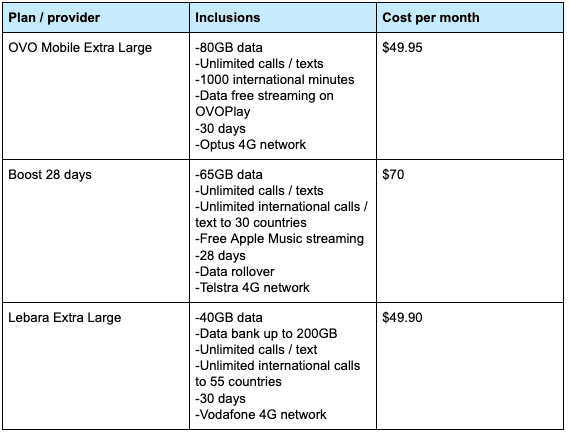- Bessie Hassan
- Head of PR & Money Expert
- finder.com.au
- +61 402 567 568
- Bessie.Hassan@finder.com.au
Media Release
Bad call? Aussies fail to challenge expensive mobile bills
- Gen Z most prone to bill shock
- Most Aussies just pay the bill instead of challenging the charges
- Tips on how to pick the best value mobile plan
12 June, 2019, Sydney, Australia - Australia may have seen a surge of better value mobile plans in the last year but many consumers are still facing bill shock, research by Finder Australia's most visited comparison site revealed.
The new survey of 1,015 people showed that one in 10 (9%) respondents – equivalent to 1.4 million Australians – have faced an unexpectedly high mobile bill in the last 12 months.
Generation Z are most prone to getting stung, with 21% stating they've faced an unexpectedly high bill in the last 12 months, in comparison to 10% of Generation Y, 6% of Generation X and 4% of Baby Boomers.
The research shows that Aussies are still underestimating their Internet usage, with excess data charges the main culprit for mobile phone bill shock. This was followed by charges racked up from making international calls.
Alex Kidman, tech expert at comparison site Finder said bill shock should be a thing of the past.
"Big data plans are becoming the norm. Telcos are offering 40GBs to 50GBs at really affordable prices so if you're constantly going over your data limit you're on the wrong plan and it's time to switch.
"If you're on a plan that includes 6GB of data, but you find yourself forking out for an extra 3GB every month consider upping your data limit. It's better to overestimate your plan by a few gigabytes than to be slapped with a hefty bill at the end of the month."
The majority (65%) of those with an unexpectedly high bill – 907,000 Australians – just paid the fees instead of calling their provider and challenging the charges.
It's confronting to see the number of Australians happy to just accept their expensive phone bills, Kidman says.
"Consumers often forget the power of their loyalty.
"If you feel like these charges aren't fair, you should call and ask your provider to waive your bill, or at least give you a discount. Most providers will help you out with the hope of keeping you as a customer.
"Make sure to keep a record of any conversations you have with your provider. Make notes, not just of the time and date, but also who you talked with."
Kidman reminds Aussies there are independent parties that can help consumers challenge their expensive bill.
"You should find instructions to dispute a bill on your providers website. If you're still not having luck and you legitimately believe you've been unfairly charged you can take it to the Telecommunications Industry Ombudsman (TIO)."
The onus is also on the consumer to make sure they're using their plan within its parameters Kidman said.
"Providers are now required to send you a message once you're about to reach your data limit. Instead of turning a blind eye to these messages and accepting the excess charges, change your usage habits.

How to avoid going of your data limit
- Switch off automatic downloads and background app refresh: One of the biggest data drainers is something you're probably totally unaware of, and that's why it's so easy to get stung! You may not be using an app but that doesn't mean it isn't drawing on data in the background. You'll also want to disable automatic downloads, you can do all this by going into the settings of your phone.
- Download your entertainment, don't stream it: If you've got a long commute you might pass the time by catching up on your favourite Netflix series, but over the course of a week all this streaming can add up. In fact, one hour of video streaming uses approximately 1GB of data. Instead, use the offline viewing function on your Netflix or Stan account and download shows when you have Wi-Fi access. If you can you should download your music, rather than stream it. It might not use much Internet but it does all add up.
- Use a data managing app: If you really want to cut down install a data managing app like My Data Manager. Although most phones will have their own inbuilt tool for measuring data, an app can send you alarms and messages when you're close to reaching your data cap. You can also check out what apps are using the most Internet and potentially change your habits accordingly.
###
For further information
- Bessie Hassan
- Head of PR & Money Expert
- finder.com.au
- +61 402 567 568
- Bessie.Hassan@finder.com.au
Disclaimer
The information in this release is accurate as of the date published, but rates, fees and other product features may have changed. Please see updated product information on finder.com.au's review pages for the current correct values.
About Finder
Every month 2.6 million unique visitors turn to Finder to save money and time, and to make important life choices. We compare virtually everything from credit cards, phone plans, health insurance, travel deals and much more.
Our free service is 100% independently-owned by three Australians: Fred Schebesta, Frank Restuccia and Jeremy Cabral. Since launching in 2006, Finder has helped Aussies find what they need from 1,800+ brands across 100+ categories.
We continue to expand and launch around the globe, and now have offices in Australia, the United States, the United Kingdom, Canada, Poland and the Philippines. For further information visit www.finder.com.au.
12.6 million average unique monthly audience (June- September 2019), Nielsen Digital Panel